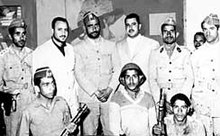Hassan al-Amri
Hassan al-ʿAmrī (* 1916 in Sanaa , Northern Yemen , † 1989 in Egypt ; Arabic حسن العمري), sometimes also transcribed as el-Amry , was a Yemeni general and politician. Between 1964 and 1971 he was Prime Minister of the Yemeni Arab Republic (Northern Yemen) five times .
"Strong Man" Yemen

Like Abdullah as-Sallal , Hassan al-Amri was one of the first group of Yemeni officers who had been trained at the Iraqi military academy in Baghdad in the 1930s on behalf of Imam (King) Yahya .
During the presidency of as-Sallal
Together with as-Sallal, al-Amri overthrew the monarchy on September 26, 1962, which sparked a civil war with the tribes who remained royalist in the north of the country. First in the Revolutionary Command Council, then in the newly created Presidential Council, al-Amri was first Transport Minister from 1962, then Minister of Economics and Finance. In June 1963 he became Vice President and Deputy Commander-in-Chief of the Republican Armed Forces, in January 1964 he became Deputy Chairman of the Supreme Political Bureau, and from February 10 to April 29, 1964, he was the first Chairman of the Executive Council (Prime Minister). Despite massive Egyptian military aid, al-Sallal's and al-Amri's republican army was unable to defeat the royalist rebels, which were heavily supported by Saudi Arabia and Jordan.
In view of the power struggles between radical and moderate republicans or between left and conservatives within the revolutionary leadership and in the presidential council, as-Sallal had to change government several times or take over himself in the meantime. Hassan al-Amri was therefore Prime Minister from January 6, 1965 to April 20, 1965 and again from July 20, 1965. During his term of office, diplomatic relations with the Federal Republic of Germany were broken off in March 1965 and a state visit by al-Amri to the GDR in October 1965 (including the conclusion of a trade agreement with the GDR in June 1966) as well as the signing of the Egyptian peace solution, which was intended as an intra-Yemeni peace solution. Saudi Jeddah Agreement of August 1965 and the following one-year stay as-Sallal in Egypt. During the President's absence, Prime Minister al-Amri acted as the "strong man" of Yemen and resigned on September 17, 1966 in the dispute over the return of al-Sallal and a reshuffle of the government.
During al-Iriani's presidency
After the withdrawal of the Egyptian troops on November 4, 1967, al-Amri staged a bloodless palace revolt together with the moderate republicans and conservatives in the revolutionary leadership, who were keen to find a compromise with moderate royalists, and al-Sallal was overthrown and exiled. The new president was Abdul Rahman al-Iriani , the new prime minister initially Muhsin al-Aini , but on December 21, 1967 al-Amri again. As head of government, member of the presidential council (vice-president) and commander-in-chief of the army, he was al-Iriani's most important supporter of power and again the real "strong man" - especially when the royalists advancing again after the retreat of the Egyptians as part of a large-scale counter-offensive for 70 days Besieged Sanaa. Al-Amri issued a general mobilization, organized the establishment of republican people's militias and was hailed as the defender of the capital after defeating the royalists.
In March 1968, al-Amri redirected arms deliveries in al-Hudaida intended for the army to conservative tribal militias, some of which had defected from the royalists to the republicans, and in May 1968 he had the people's militias in Sanaa dissolved again and tribal militias replaced. In August 1968, however, he defeated the Nasserist officers and army units who rose up in Sanaa in three days of street fighting with the help of the tribal militias, which initially consolidated the Iriani regime and decided the conservative orientation of the republic. He resigned as Prime Minister on July 9, 1969, but remained Commander-in-Chief of the Army and, following a successful intra-Yemeni peace and reconciliation agreement (1970), was again charged with forming a government on August 24, 1971.
However, al-Amri's personal involvement in the murder of a critical journalist ended his career at the very moment when al-Iriani himself threatened to become too powerful. On September 1, 1971, he had to resign and initially flee to Iraq to avoid prosecution. He never returned to Yemen and eventually died in Egypt.
literature
- Lothar Rathmann : History of the Arabs - From the beginnings to the present , Volume 6 (The struggle for the path of development in the Arab world), pages 308-314. Akademie-Verlag Berlin 1983
- Munzinger Archive / Internationales Handbuch - Zeitarchiv 31/84, page 4 (Arab Republic of Yemen Contemporary History). Ravensburg 1984
- Gustav Fochler-Hauke (Ed.): Der Fischer Weltalmanach 1969 , page 346f. Frankfurt am Main 1968
- Dr. Werner Rosenberg : Die Welt - data, facts, information of the year 1965 , page 322f. Dietz Verlag Berlin 1966
- Robert D. Burrowes: Historical Dictionary of Yemen , 29–29. Lanham 2010
- Robin Leonard Bidwell : Dictionary of Modern Arab History , 31-31. Routledge, New York 1998
Web link
- Hassan el-Amri , Internationales Biographisches Archiv 13/1974 of March 18, 1974, in the Munzinger Archive ( beginning of article freely available)
| personal data | |
|---|---|
| SURNAME | Amri, Hassan al- |
| ALTERNATIVE NAMES | Amry, Hasan el- |
| BRIEF DESCRIPTION | Yemeni politician and military |
| DATE OF BIRTH | 1916 |
| PLACE OF BIRTH | North Yemen |
| DATE OF DEATH | 1989 |
| Place of death | Egypt |
